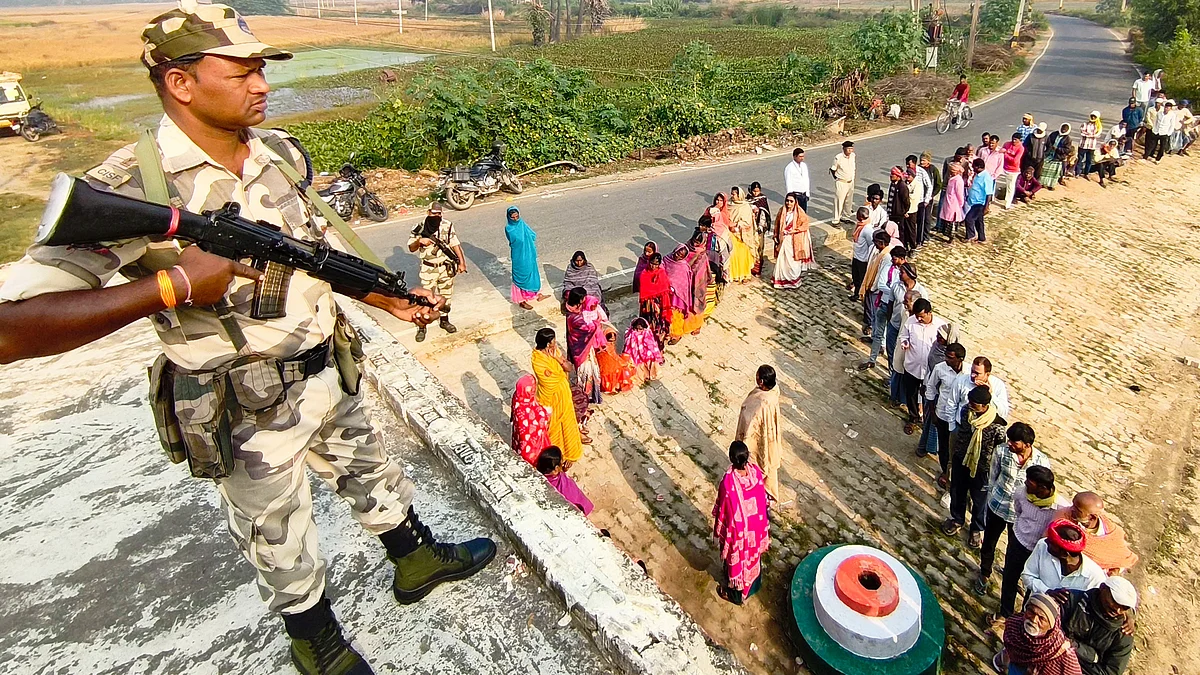Jeevika Didis deployed on poll duty in Bihar by Election Commission
Press note states that 1.80 lakh Jeevika Didis, most of whom received a one-time cash transfer ahead of the election, were on duty

The Election Commission of India (ECI) was questioned earlier this month when it became known that it had allowed the Bihar government to disburse the second and third tranche of the cash-transfer scheme during the electoral process between 1 and 11 November.
The Opposition described it as a brazen act of bribery and ‘cash-for-vote’ scheme and declared that it amounted to a corrupt practice under the Representation of Peoples Act (RPA). It also appeared to violate the Model Code of Conduct (MCC).
The ECI dismissed the objection because the scheme — announced in August with Prime Minister Narendra Modi disbursing the first tranche in September, 10 days before the election was notified on 6 October — was an ongoing one, it claimed. Several past election commissioners disagreed and pointed out that ‘ongoing schemes’ meant public projects like roads and bridges, on which work started before the notification. It did not apply to schemes directly benefiting individual citizens and voters.
Even before the dust had settled on that controversy, the ECI has asserted that it deployed 1.80 lakh Jeevika Didis (largely members of women's self-help groups or SHGs) on both polling days — 6 and 11 November. That is akin to deploying women beneficiaries of similar cash-transfer schemes in Madhya Pradesh and Maharashtra. Remember, most Jeevika Didis received a one-time cash transfer of Rs 10,000 each ahead of the election to ostensibly set up a ‘business’.
Were the women in MP and Maharashtra also deployed on election duty? If not, why then in Bihar? The press note specifically mentions that on each polling day, there were 45,000 polling stations to be manned and on each day, 90,000 Jeevika Didis were deployed in addition to 4.5 lakh ‘polling staff’ and security.
It was left to CPI(ML) general-secretary Dipankar Bhattacharya to draw attention to this unusual deployment. In an X post shared after 8.00 pm on 12 November, he wrote, “The press note issued by the Election Commission mentions the deployment of around 1,80,000 Jeevika Didis on election duty. Why Jeevika Didis? What was their duty? Since when are they being involved in poll duty? We of course know how Jeevika Didis have been used to mobilise women voters for NDA.”
There has been no response from the ECI as of Thursday morning. Judging by its recent conduct, a clarification seems unlikely. The official admission raises several questions. Was the admission unintended and inadvertent? If not, why did the ECI think it necessary to draw public attention before the counting and place it on record? Were the Jeevika Didis promised any payment for the job they did? Were they called for training? Who did they report to?
The admission has further muddied the already vitiated electoral process in the state. Amidst allegations of strongrooms being opened at 3.00 am, CCTV cameras being switched off, and a large number of BJP office bearers from Delhi, Uttar Pradesh and Uttarakhand also voting in Bihar, the latest controversy over Jeevika Didis has added to growing public distrust.
The ECI is yet to react to Facebook posts by BJP leaders in Haryana who boasted of paying for special trains to send back migrant workers from Bihar back home on 3 November to vote. Videos released by Rajya Sabha MP Kapil Sibal shows these workers admitting that BJP leaders had paid for their food and fare. This appears to violate provisions in the RPA which holds that political parties cannot offer any inducement, not even a cup of tea, to voters. They are not allowed to provide any transportation either.
The ECI also has not cared to explain how BJP supporters who cast their vote in the Delhi Assembly election in February this year, could also cast their vote in Bihar in November. The process has put question marks on the Special Intensive Revision (SIR) of electoral rolls conducted by the Commission. While the ECI has consistently held that voters must be ‘ordinarily resident’ of a constituency to be eligible to vote, the SIR, it is claimed, has done away with such ‘duplicate’ voters.
Chief election commissioner Gyanesh Kumar explained it further by adding that if a voter works in Delhi and has a home in Patna, he or she would be deemed to be a voter in Delhi. The polling in Bihar has exposed several BJP functionaries working in Delhi, Haryana and Uttarakhand, casting their vote in Bihar. Some of them appear to have in their possession more than one EPIC (Electors’ Photo Identity Card) issued by the Commission.
Kumar surely needs to hold another press conference to clear the air and dispel growing doubts about the fairness of the ECI.
Follow us on: Facebook, Twitter, Google News, Instagram
Join our official telegram channel (@nationalherald) and stay updated with the latest headlines
